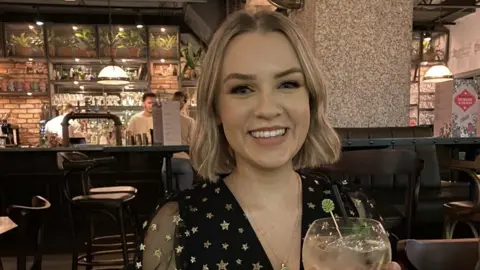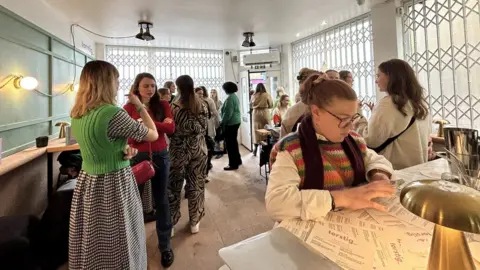Dry January: 'I saved £200 by giving up alcohol'
 Jasmine Hoole
Jasmine HooleDrinkers who gave up booze for Dry January saved on average £118, according to Alcohol Change UK.
The charity said more than 100,000 people downloaded its Try Dry app to track the financial benefits.
But pubs have reported a drop in drinks sales, while the prices of no and low-alcohol drinks are rising faster than their boozy counterparts.
Jasmine Hoole tried Dry January for the first time and said it boosted her bank balance as well as her energy levels.
"I have managed to save myself £200 for my holiday fund which I am super happy about as I normally find it quite hard to save for these kind of things," she said.
Alcohol Change UK estimated 8.5m people planned to go alcohol free in January. Its survey of 2,000 people in November included those who do not drink during the rest of the year.
Ms Hoole is also one of more than 100,000 people who downloaded the charity's official Try Dry app which tracks days without alcohol and the financial savings of a booze-free month.
UK users of the app saved on average £118 this Dry January, compared with £117 last year, Alcohol Change UK said.
Impact on pubs
However, all this extra cash in punters pockets is hitting the hospitality industry hard. CGA consultancy which works with the alcohol industry said drink sales at UK bars were down by seven per cent in January.
A survey for the Beer and Pub Association, carried out by polling service Find Out Now, suggested 1 in 10 of 2,230 respondents had given up alcohol for Dry January.
Sasha Lord, chairman of the Night Time Industries Association, told BBC Breakfast pubs and bars in the UK had noticed "a slight downward fall off due to the cost of living".
He said: "I think we now need to start breaking away from this mould that to go to a pub you have to have a pint.
"We know times are hard but if you are in the fortunate position that you can go out, maybe for a bite to eat, or come to the pub and have a pint, non-alcoholic pint, please do it."
As the popularity of alcohol alternatives has been rising - so have the prices. The cost of no and low alcohol beer and cider has been going up faster than the boozy versions, according to data by Assosia, and analysed by The Grocer magazine.
The research suggests a surge of 13.3% in the prices of non-alcoholic alternatives since the beginning of last year. In comparison, full-strength beer and cider experienced a milder increase of 10.4%
Price rises
Assosia compared display prices on 1 January 2024 to those in the same week of 2023 in the UK's major supermarkets Sainsbury's, Morrison's, Tesco's, Asda and Waitrose.
One of the biggest price changes was found in Waitrose where a 500ml bottle of Erdinger Alkoholfrei Wheat Beer rose 75% from £1 to £1.75.
Waitrose said the price increase was down to the drinks returning to their regular prices in January 2024, having been on offer previously.
Meanwhile in Sainsbury's 12 packs of Heineken 0.0 Alcohol-Free Lager jumped from £7 to £11.50.
Sainsbury's said the conclusions in the report were "misleading" because it compared mostly promotional prices in 2023 with base prices in 2024.
"Prices can go up and down for a range of reasons but we're committed to offering our customers great value," a spokesperson said.
James Beeson, drinks editor at The Grocer, said: "Even if we discount the impacts of promotional activity, we're still seeing low and no alcohol beer and cider prices on the rise."
The British Retail Consortium said one reason for this could be that many alcohol-free and low alcohol drinks do not yet benefit from the same economies of scale in production as traditional alcoholic drinks.
"Nonetheless, retailers are focused on value for every product they sell including low alcohol drinks, and will continue to deliver the best choice and prices for their customers," a spokesperson said.

One of the UK's first alcohol free bars hosted a pop up in London in January. It's called Torstig, which means 'thirsty' in Danish.
The concept was launched by husband and wife duo Emmi Edwards and Luke Cousins who were inspired by Denmark's thriving alcohol-free drinks scene.
With the bar's cocktails priced up to £9 per drink, many are as expensive or more than their alcoholic counterparts.
Mrs Edwards said: "We say you're paying to not have a hangover but also you're paying to appreciate what's gone into making that drink.
"Most of the drinks start their process at 40 per cent spirit, and then the alcohol is taken away and the drink is rebalanced with lots of flavours, botanicals, minerals and herbs," she explained.
Mr Cousins said the ingredients for their mocktails were pricey and that it would be cheaper to make them with alcohol.
Included in the price are the mood altering effects customers can gain with some drinks making you more relaxed while others can give you a buzz or help you feel more focused and sociable.

We caught up with Dry January first-timer Miss Hoole at an event at Torstig hosted by The Sober Girls Society, a community for women looking to change their relationship with alcohol.
She said: "I've had two drinks so I guess I've spent £15 or £16 but if I'd been drinking [alcohol] it probably would have turned into a whole afternoon of drinking so I've definitely saved money."
Miss Hoole said the benefits of Dry January were more than financial.
"[Alcohol] does give you a bit of extra social courage so I'm learning to pick that up on my own which I think is great for my own mental health and confidence to improve those skills.
"It's been quite a game-changer for me and probably something I'll be sticking with past January," she said.

Tips for saving money on alcohol
- Before you go out, set a limit for how much you're going to drink and a budget for your spending on alcohol.
- Tell your friends and family that you're trying to cut down.
- Take it steady - try cutting back a little more every time you drink.
- Mix up your habits, order a small glass or a half-pint instead and alternate alcoholic drinks with soft ones.

Update 6th February: This article originally reported that the British Beer and Pub Association had said 1 in 5 people had given up alcohol this January. A PR company working on behalf of the association subsequently confirmed that this figure is inaccurate and that they had conducted a survey of more than 2,000 people which suggested 1 in 10 people had given up alcohol. We have amended the article to make this clear.
